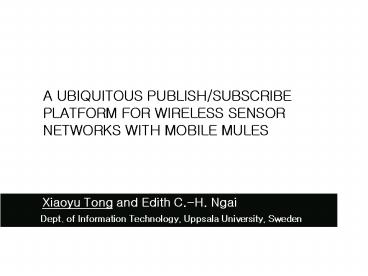A UBIQUITOUS PUBLISH/SUBSCRIBE PLATFORM FOR WIRELESS SENSOR NETWORKS WITH MOBILE MULES - PowerPoint PPT Presentation
Title:
A UBIQUITOUS PUBLISH/SUBSCRIBE PLATFORM FOR WIRELESS SENSOR NETWORKS WITH MOBILE MULES
Description:
A UBIQUITOUS PUBLISH/SUBSCRIBE PLATFORM FOR WIRELESS SENSOR NETWORKS WITH MOBILE MULES Xiaoyu Tong and Edith C.-H. Ngai Dept. of Information Technology, Uppsala ... – PowerPoint PPT presentation
Number of Views:164
Avg rating:3.0/5.0
Title: A UBIQUITOUS PUBLISH/SUBSCRIBE PLATFORM FOR WIRELESS SENSOR NETWORKS WITH MOBILE MULES
1
A UBIQUITOUS PUBLISH/SUBSCRIBE PLATFORM FOR
WIRELESS SENSOR NETWORKS WITH MOBILE MULES
Xiaoyu Tong and Edith C.-H. Ngai Dept. of Information Technology, Uppsala University, Sweden
2
Problems of Ubiquitous Sensing
- Stationary sensors are more likely to be sparsely
deployed in most scenarios. - But it is cost prohibitive to connect each of
them to the Internet at every site. - As a result, their deployments and usages are
heavily limited.
Sparsely Deployed Temperature Sensors in a Forest
3
Problems of Ubiquitous Sensing
- On the other hand, applications of mobile sensors
become incredibly popular. - But they are constrained by sensor types and
abilities. - Our goal
- Easier and more flexible deployments of
stationary sensors. - Enable ubiquitous sensing services from both
stationary sensors and mobile sensors.
4
System Model
- Publish/subscribe paradigm is employed to support
asynchronous communications. - Smart phones are utilized as both mobile sensors
and data mules. - Built-in sensors GPS, Camera, etc.
- Short range communication with wireless sensors,
IEEE802.15.4, Bluetooth, or ANT. - Encounter and communicate with wireless sensors
opportunistically. - Stationary sensors are sparsely deployed.
5
Key Challenges
- Deployments of both stationary sensors and mobile
sensors are dynamic. - Communication overhead will draw power quickly
from both mobile phones and stationary sensors. - Mobile users who carry the smart phones have
individual and uncontrollable mobility.
6
Related Work
- MQTT-S has been proposed to enable topic-based
publish/subscribe in WSNs. - Huang et al. described how to distribute the
system across multiple computers or mobile
devices to distribute load and cope with
failures, message loss and disconnections. - The above works focus on adoption of
publish/subscribe in WSNs and publish/subscribe
system with mobile environments, while the
sensing context, heterogeneity of sensing
devices, mobility of nodes and limited
connectivity of wireless sensors remain to be
further explored.
7
Network Model
- Stationary Sensor SSensor.
- Mobile Sensor MSensor.
- Platform Server Broker.
- Mobile Phone Mobile Broker.
- Sparse Sensor Networks SSNs.
8
Publish/Subscribe Platform Design
- Area-based Subscriptions
9
Publish/Subscribe Platform Design
- Adaptive Location Updates
- How often should a MB update its locations?
- Default periodically with constant time interval
- Reduce unnecessary location updates
10
Publish/Subscribe Platform Design
- Full Installation
- Best-effort Subscription Delivery
- Number of MSensors in a target area is higher
dynamic. - Installations of subscriptions to SSensors are
opportunistic. - Keep deployments of sensors transparent to
platform.
11
Publish/Subscribe Platform Design
- Event Data Collection
- ECF flag avoiding unnecessary collection.
- Push-based event collection for MSensors.
- Pull-based event collection for Ssensors.
12
Implementation
- Broker
- Restful Http Server.
- Mobile Broker
- Android Usb cable IEEE 802.15.4.
- ANT or Bluetooth 4 in the future
- Stationary Sensor
- Contiki Rime Coffee IEEE802.15.4.
13
Experimentation
- Scenario and Settings
14
Experimentation
- Installation of Stationary Sensors along Hiking
Trail.
15
Experimentation
- Sensing Data from Stationary Sensors
16
Experimentation
- Sensing Data from Mobile Sensors
17
Experimentation
- Sensing Data from Mobile Sensors
18
Experimentation
- Data Delivery Delay
19
Experimentation
- Number of Received Data
20
Experimentation
- Communication Overhead
21
Summary
- We proposed and implemented a novel
publish/subscribe platform for ubiquitous data
access from both wireless sensors and mobile
phones without relying on any network
infrastructure. - Mobile phones are utilized as mobile mules to
relay subscriptions and published data between
the Internet users and the remote sensors. - We implemented our platform on real hardwares and
experimented it in a hiking trail application. - In the future, we plan to study the coordination
among heterogeneous mobile and sensing devices to
further reduce the energy consumption and
communication overhead.

